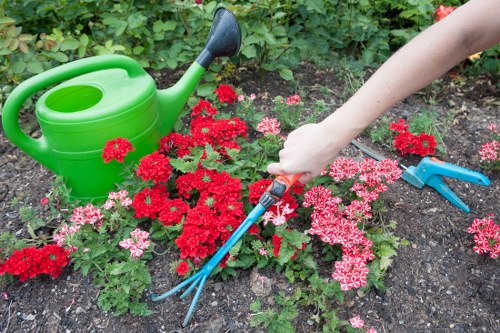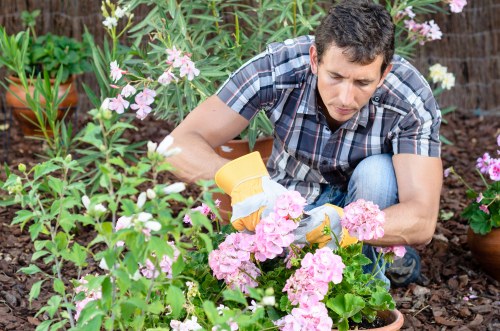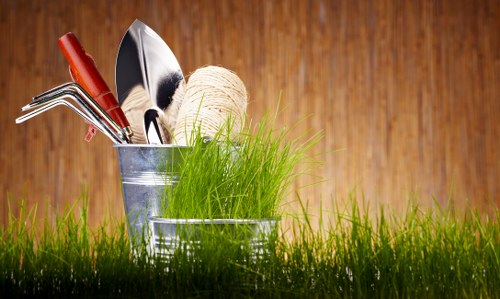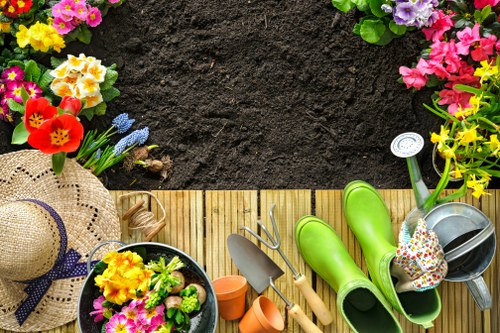Gardener Goddington: Cultivating Excellence in Horticulture

Gardener Goddington has become a beacon of excellence in the world of horticulture. With a passion for plants and a commitment to sustainable gardening practices, Goddington has transformed countless gardens into lush, vibrant spaces. Whether you're a seasoned gardener or just starting, understanding the principles and techniques advocated by Gardener Goddington can help you cultivate a thriving garden.
At the heart of Goddington's philosophy is the belief that gardening should be both an art and a science. This balance ensures that gardens are not only aesthetically pleasing but also environmentally sustainable. By integrating scientific knowledge with creative design, Gardener Goddington offers a holistic approach to gardening that benefits both the gardener and the ecosystem.
One of the key aspects of Gardener Goddington's approach is the emphasis on soil health. Healthy soil is the foundation of any successful garden. Goddington advocates for regular soil testing, the use of organic fertilizers, and the incorporation of compost to enrich the soil. These practices not only improve plant growth but also promote biodiversity and reduce the need for chemical interventions.

In addition to soil management, Gardener Goddington places a strong focus on plant selection and diversity. By choosing a variety of plants that complement each other, gardeners can create resilient gardens that can withstand pests, diseases, and changing weather conditions. Goddington encourages the use of native plants, which are well-adapted to the local climate and support local wildlife.
Water conservation is another critical component of Gardener Goddington's methodology. Efficient watering practices, such as drip irrigation and rainwater harvesting, help reduce water waste and ensure that plants receive the optimal amount of moisture. Goddington also advises gardeners to plant drought-resistant species and use mulching techniques to retain soil moisture.
Gardener Goddington's dedication to sustainable practices extends beyond the garden itself. He advocates for environmentally friendly gardening tools and techniques that minimize the carbon footprint of gardening activities. From using electric tools to composting garden waste, Goddington's approach ensures that gardening contributes positively to the planet.

The Principles of Gardener Goddington
Understanding the core principles of Gardener Goddington can transform your gardening experience. These principles are designed to promote sustainability, efficiency, and beauty in every garden.
1. Sustainability
At the forefront of Goddington's philosophy is sustainability. This means making gardening choices that are environmentally responsible and reduce the impact on natural resources. Sustainable gardening practices include using organic fertilizers, conserving water, and promoting biodiversity.
2. Soil Health
Healthy soil is essential for plant growth. Goddington emphasizes the importance of maintaining soil fertility through natural means. Techniques such as crop rotation, cover cropping, and the addition of organic matter help improve soil structure and nutrient content.
3. Plant Diversity
Diverse plantings not only enhance the visual appeal of a garden but also create a balanced ecosystem. By planting a variety of species, gardeners can attract beneficial insects, birds, and other wildlife that contribute to a healthy garden environment.

4. Water Conservation
Efficient water use is a key component of sustainable gardening. Goddington recommends practices such as drip irrigation, mulching, and the use of drought-tolerant plants to minimize water usage.
5. Eco-Friendly Practices
Gardener Goddington encourages the use of eco-friendly gardening tools and methods. This includes using compostable materials, recycling garden waste, and opting for manual tools over gas-powered ones to reduce environmental impact.
Implementing Goddington's Techniques in Your Garden
Adopting Gardener Goddington's techniques can lead to a more productive and sustainable garden. Here are some practical steps to get started:
- Test your soil regularly and amend it with organic fertilizers as needed.
- Choose a diverse range of plants, including native species, to enhance biodiversity.
- Implement water-saving measures like drip irrigation and rain barrels.
- Use compost to enrich the soil and reduce waste.
- Opt for manual gardening tools to minimize your carbon footprint.

Local Gardening Insights: Surrounding Areas of Goddington
Gardener Goddington serves a diverse community, and understanding the unique features of nearby areas can enhance your gardening experience. Here are some of the closest areas to Goddington and what makes each unique:
- Larkspur Woods – Located just 2 miles north of Goddington, Larkspur Woods offers rich, loamy soil ideal for a variety of plants.
- Maple Creek – 3 miles east, this area is known for its abundant water sources, perfect for water-loving plants.
- Pine Ridge – Situated 4 miles west, Pine Ridge provides a cooler climate that benefits shade-tolerant species.
- Sunnyvale – 5 miles south, Sunnyvale's sunny disposition is perfect for growing vibrant, sun-loving flowers.
- Willow Bend – 6 miles southeast, Willow Bend is characterized by its sandy soil, ideal for drought-resistant plants.
- Elm Grove – 7 miles northeast, Elm Grove has fertile soil that supports a wide range of vegetables and herbs.
- Birch Hill – 8 miles northwest, Birch Hill features rocky terrain, suitable for planting stone-loving succulents.
- Cedar Flats – 9 miles southwest, Cedar Flats offers a mix of clay and gravel, perfect for robust, hardy plants.
- Oak Meadow – 10 miles north, Oak Meadow's expansive spaces are ideal for large garden beds and community gardens.
- Silver Lake – 11 miles east, Silver Lake provides a serene environment with ample sunlight, great for ornamental gardens.
Benefits of Following Gardener Goddington's Approach
Adopting the principles advocated by Gardener Goddington offers numerous benefits:
- Enhanced Plant Health: Practices like soil enrichment and proper watering ensure plants thrive.
- Environmental Sustainability: Eco-friendly methods reduce the garden's carbon footprint.
- Cost Efficiency: Sustainable gardening often leads to lower maintenance costs over time.
- Aesthetic Appeal: Diverse and healthy plantings create visually stunning landscapes.
- Community Engagement: Gardens can become communal spaces that bring people together.
Challenges and Solutions
While gardening can be rewarding, it comes with its own set of challenges. Gardener Goddington offers solutions to common gardening issues:
- Pest Control: Use natural predators and organic pesticides to manage pests without harming beneficial insects.
- Disease Management: Implement crop rotation and select disease-resistant plant varieties to prevent outbreaks.
- Weather Extremes: Protect plants from extreme weather by using shade cloths, windbreaks, and proper irrigation.
- Soil Degradation: Maintain soil health with regular composting and the addition of organic matter.
- Weed Control: Use mulching and manual weeding to keep unwanted plants at bay without chemicals.
Gardener Goddington’s Impact on the Community
Gardener Goddington has not only improved individual gardens but also had a significant impact on the broader community. Through workshops, community gardens, and educational programs, Goddington has empowered many to embrace sustainable gardening. This has led to greener neighborhoods, increased local biodiversity, and a stronger sense of community among residents.
Conclusion
Gardener Goddington embodies the perfect blend of passion, expertise, and dedication to sustainable gardening. By following his principles, gardeners can create beautiful, resilient, and eco-friendly gardens that benefit both themselves and the environment. Whether you're tending to a small backyard or managing a large community garden, Gardener Goddington's insights provide valuable guidance for achieving gardening excellence.
Frequently Asked Questions
1. Who is Gardener Goddington?
Gardener Goddington is a renowned gardening expert known for his sustainable and holistic approach to horticulture. He has transformed numerous gardens and educated many on eco-friendly gardening practices.
2. What are the key principles of Gardener Goddington's gardening philosophy?
The key principles include sustainability, soil health, plant diversity, water conservation, and eco-friendly practices. These principles aim to create thriving gardens while minimizing environmental impact.
3. How can I implement Gardener Goddington's techniques in my own garden?
You can start by testing and enriching your soil with organic matter, choosing a diverse range of plants, conserving water through efficient irrigation, composting garden waste, and using eco-friendly gardening tools.
4. What are the benefits of following Gardener Goddington's methods?
Benefits include enhanced plant health, environmental sustainability, cost efficiency, increased aesthetic appeal, and stronger community engagement.
5. Are Gardener Goddington's techniques suitable for all types of gardens?
Yes, his techniques are versatile and can be adapted to various garden sizes and types, from small urban gardens to large community plots.